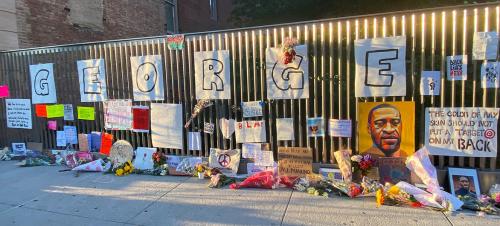Citing ‘weight of history’, senior UN officials of African descent issue call to ‘go beyond and do more’ to end racism
A group of more than twenty senior leaders in the UN, who report directly to Secretary-General António Guterres, and who are African or of African descent, have put their names to a personal and hard-hitting statement published on Friday, expressing their outrage at pervasive and systemic racism, highlighting the need to ‘go beyond and do more’ than just offering condemnation.

An impromptu memorial for George Floyd, who was killed after being restrained by police, has been set up in Harlem, New York City.
The signatories include high-profile heads of UN agencies, such as Tedros Ghebreyesus, head of the World Health Organization (WHO), Winnia Byanyima, Executive-Director of UNAIDS, and Natalia Kanem, who runs the UN sexual and reproductive health agency (UNFPA).
The editorial begins by evoking the death of George Floyd, the African-American man who died after a Minneapolis police officer knelt on his neck for more than eight minutes: “A desperate yearning for a long-departed mother. Reaching deep from the bowels of fragile humanity. Grasping for breath. Begging for mercy. The entire world heard the tragic cry”.
Citing the “deep trauma and inter-generational suffering” that has resulted from racial injustice, particularly against people of African descent, the opinion piece written in their personal capacity, declares that it is time to go further than simply condemning acts of racism, described as “a global scourge that has been perpetuated over centuries”.
Time to step up
The leaders call on the UN to “step up and act decisively to help end systemic racism against people of African descent and other minority groups”, citing Article 1 of the United Nations Charter, which stipulates that the UN promotes and encourages “respect for human rights and for fundamental freedoms for all, without distinction as to race, sex, language, or religion”.
Highlighting the historic role of the UN in pivotal struggles against racism –such as the ending of apartheid in South Africa, the emancipation of former African colonies, and the civil rights movement in the United States – the editorial calls on the UN to “use its influence to once again remind us of the unfinished business of eradicating racism, and urge the community of nations to remove the stain of racism on humanity”.
Acknowledging efforts by UN chief António Guterres to address systemic racism at all levels, including within the UN, the authors of the letter note that the Organization must lead by example, with “an honest assessment of how we uphold the UN Charter within our institution”.
An obligation to speak up
The expression of solidarity with peaceful demonstrations, such as the protests organized by Black Lives Matter and other groups arguing for racial justice, and “other mass demonstrations against systemic racism and police brutality”, is, say the senior UN officials, “well in keeping with our responsibilities and obligations as international civil servants to stand up and speak out against oppression. As leaders we share the core beliefs and the values and principles enshrined in the Charter of the United Nations that do not leave us the option to keep silent”.
The editorial goes on to say that the officials commit to harnessing their expertise, leadership and mandates, to “address the root causes and structural changes that must be implemented if we are to bring an end to racism”.
The opinion piece ends with quotations from renowned human rights and anti-racism activists, including Martin Luther King, Nelson Mandela, and Archbishop Desmond Tutu’s statement that “black liberation is an absolutely indispensable prerequisite to white liberation: nobody will be free until we all are free”.
Source:UN
- 292 reads
Human Rights
Ringing FOWPAL’s Peace Bell for the World:Nobel Peace Prize Laureates’ Visions and Actions

Protecting the World’s Cultural Diversity for a Sustainable Future

The Peace Bell Resonates at the 27th Eurasian Economic Summit

Declaration of World Day of the Power of Hope Endorsed by People in 158 Nations

Puppet Show I International Friendship Day 2020

